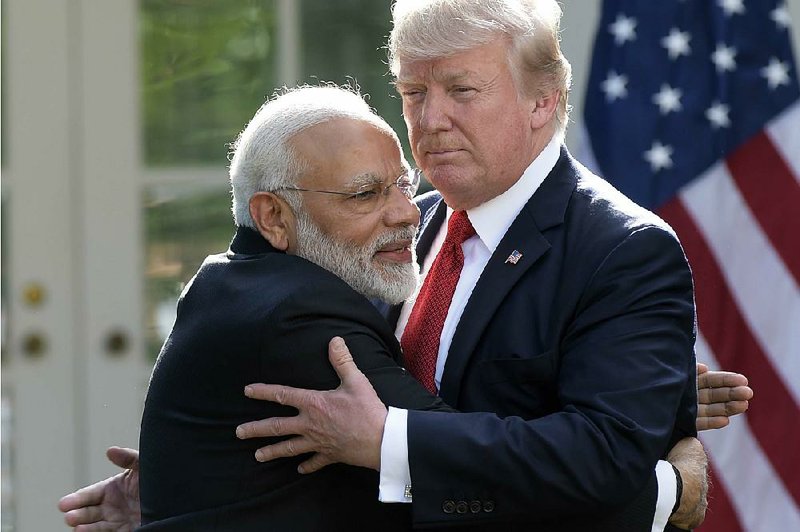WASHINGTON -- Hugging outside the White House on Monday, President Donald Trump and India's Prime Minister Narendra Modi heralded an increasingly close strategic partnership as the U.S. branded a top militant from neighboring Pakistan as a "global terrorist."
Trump declared he was a "true friend" of India and said relations between the two largest democracies have never been better. But there were some tensions in the inaugural meeting between the two populist leaders. On trade, Trump demanded fewer barriers for American companies exporting to India.
Speaking in the Rose Garden after their talks, Trump said: "Both our nations have been struck by the evils of terrorism, and we are both determined to destroy terrorist organizations and the radical ideology that drives them. We will destroy radical Islamic terrorism."
Modi, a Hindu nationalist but also leader of a nation with nearly 175 million Muslims, did not use the same, charged terminology. He stressed the importance of "doing away" with terrorist sanctuaries and safe havens, apparently reflecting Indian concerns about militants based in Pakistan, India's historical archrival. He said the U.S. and India will enhance intelligence sharing.
[TRUMP: Timeline of president-elect’s career + list of appointments so far]
During brief Oval Office remarks, Trump heaped praise on Modi as a "great prime minister" who had brought economic growth to India. Modi recalled Trump's visits to India long before he was president and said he was looking forward to collaborating with him now that he is president.
"The relationship between the United States and India is very, very strong and very, very powerful," Trump said. "We agree on most things. And I would say, by the end of the day we'll agree on everything. I have a feeling," he joked.
Hours before Modi's arrival, the State Department imposed sanctions on Syed Salahuddin, the Pakistan-based leader of Hizbul Mujahideen, the main rebel group that fights against Indian control in the divided Himalayan region of Kashmir. India's Foreign Ministry hailed the move.
Trump has so far focused on outreach to China, India's other strategic rival, as he looks to Beijing to rein in nuclear-armed North Korea. But Washington and New Delhi share concerns about China's rise as a military power, which have underpinned increasingly close relations in the past decade.
The Trump administration says it wants to provide India the kind of defense technology it does to the closest U.S. allies. In a concrete indication of that, the U.S. State Department approved the $365 million sale of a C-17 military transport aircraft. The administration is also set to offer a $2 billion sale of U.S.-made unarmed drones to help in surveillance of the Indian Ocean.
Trump thanked Modi for India's purchase of U.S. military equipment. Since 2008, India has signed more than $15 billion in U.S. defense contracts.
Although Modi's two-day Washington visit, which began Sunday, is lower key than his previous three trips to the U.S. since he took office in 2014, there was plenty of opportunity for face time with Trump.
Modi later joined the president and first lady for dinner -- the first dinner Trump has hosted for a foreign dignitary at the White House, although he has hosted the leaders of Japan and China at his resort in Florida.
Before going to the White House, Modi met separately with Secretary of State Rex Tillerson and Defense Secretary James Mattis.
One area of possible disagreement for the leaders is their economic nationalist agendas. While Trump champions the idea of "America First" and wants to stop the migration of jobs overseas, Modi has his own drive to boost manufacturing at home, dubbed "Make in India."
India is among the nations singled out by the Trump administration for their trade surpluses with the U.S., and it is also reviewing a visa program used heavily by skilled Indian workers.
The U.S. deficit in goods and services with India last year was about $30 billion.
"It is important that barriers be removed to the export of U.S. goods into your markets and that we reduce our trade deficit with your country," Trump said.
But Trump also lauded Modi's economic stewardship, and the praise was mutual. Modi, who invited the president and his family to visit India, extolled Trump's leadership qualities. He said the president's "vast and successful experience in the business world will lend an aggressive and forward-looking agenda to our relations."
Information for this article was contributed by Jill Colvin, Nirmala George and Catherine Lucey of The Associated Press.
A Section on 06/27/2017
